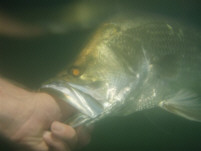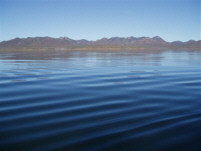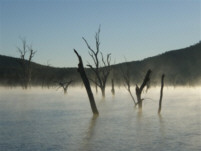
 |
 |
|||||||||||

| Water Temperature for Lake Barramundi by Johhny Mitchell |
|
Water
Temperature Click
on image for larger version
Average surface temperatures on the day can produce the best fishing in winter. Fishing the fringes in water that is cooler than that of shallower back pockets will see many barra landed, so an angler needs to expand on reasons as to why barra can be caught in contrasting water temperatures. Is temperature as important as one thinks for angling purposes? The winter of 2007 will go down as a harsh period for landlocked barramundi in Australia. Awoonga's daytime surface temperatures dropped to at least 14.9 degrees Celcius. Chartered barra trips at this time saw up to two and three barramundi hooked per session in these difficult circumstances. Lake Awoonga's barramundi were still catchable in these ultimate extremes amongst chilling South-West winds, so it's almost fair to say that it is never too cold to catch barra in Lake Awoonga, but death is imminent if conditions worsen. It was basically the rock bottom balancing point. Click on image for larger version On a complete reversal, water temps in summer can reach 35 Degrees Celcius in lakes and sensational fishing can be had in shallow and deep regions, casting and trolling. There are 4 major terms that come to mind with this temperature topic. Temperature fluctuation, temperature stability, lake current flow and barramundi digestive systems. To add further light on a central topic, successful warm water fishing circumstances may quite often only appear one day a week in winter, leaving an angler who hunts for warm water searching for Loch Ness on the next six. Fish that search for a heat advantage do so at a certain stage of digestion. Depending on what stage of the bodily process these fish are at, some will and some won't strike a lure or food offering. So
when you visit a barra lake you wiill find fish that at times
look for the best suitable water to help digest food and others
that don't require that added help from mother nature at that
time. It solely depends on the water conditions created by the
weather. Variances in food item sizes taken by barra are often
dictated by times of stability and increase in temperature versus
times of fluctuating temperatures. Taking notes on temperature
movement and duration is a key. There is so much more than meets
the eye. Open minds open doors. Click
on image for larger version
Johhny
MitchellRelated
Topics:
|
| Copyright© 2008 Johnny Mitchell. Sweetwater Fishing Australia |



